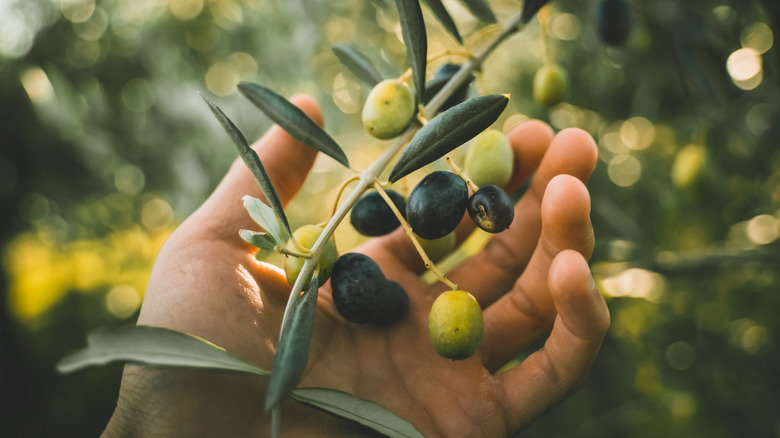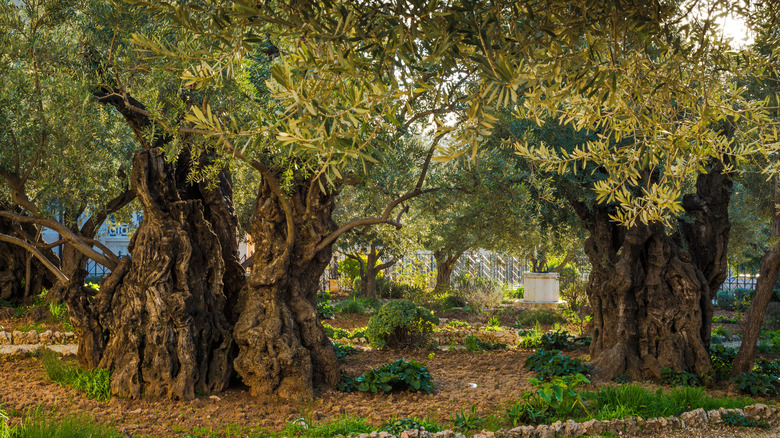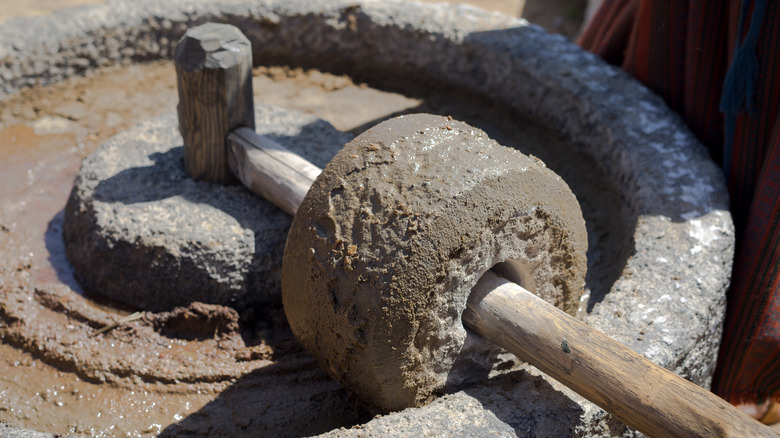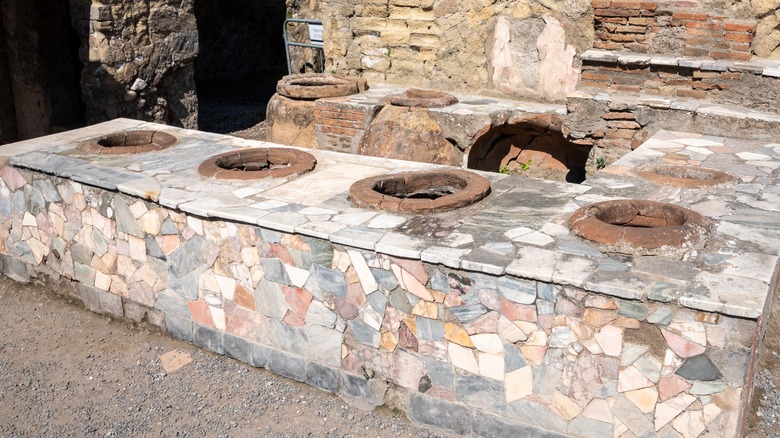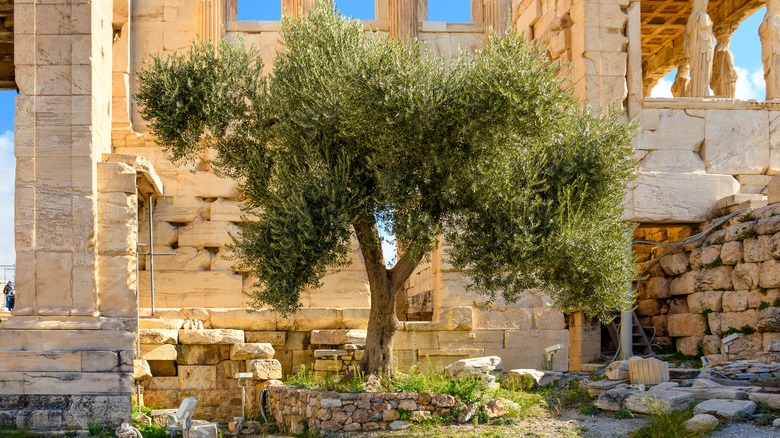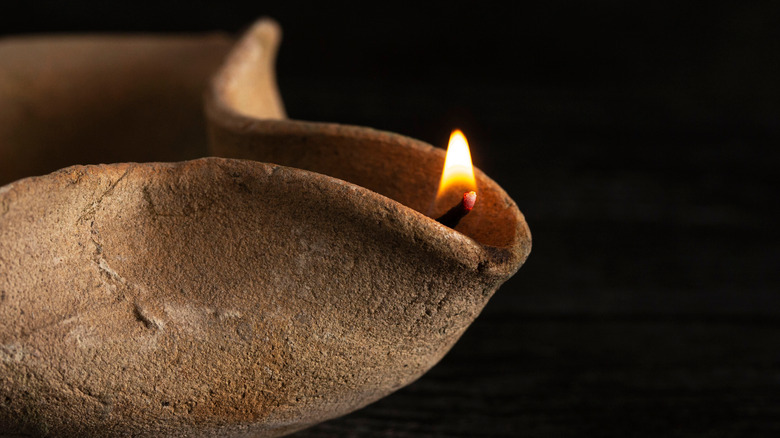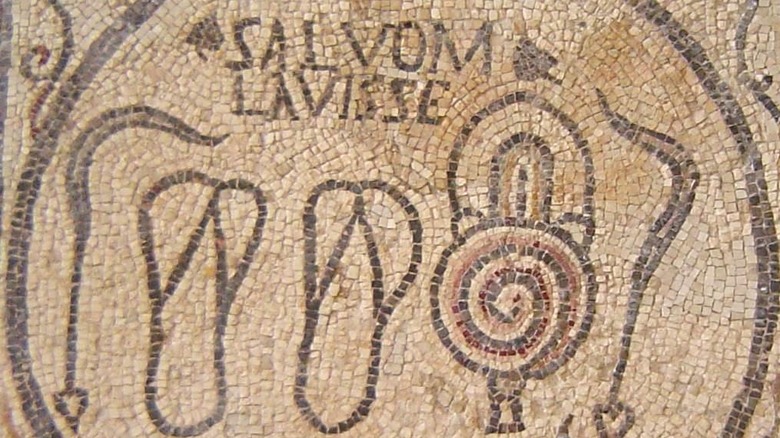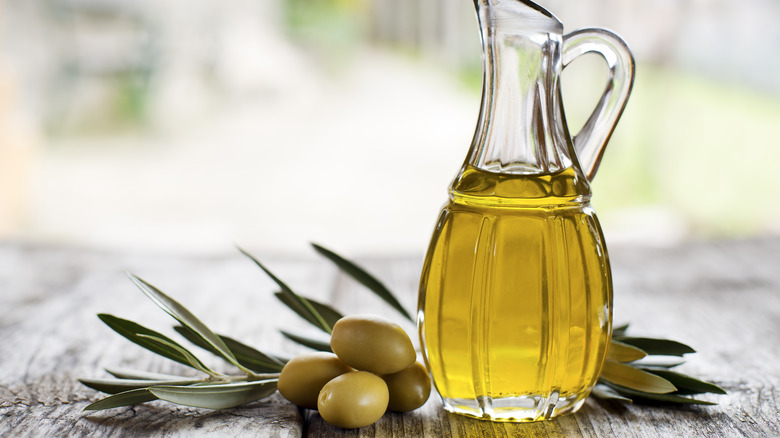The Truly Ancient Origins Of Olive Oil
In kitchens across the world, it's not difficult to find a bottle of olive oil, making a fragrant, fruity, and flavorsome addition to all kinds of dishes. It's an abundant enough cooking ingredient to seem utterly unremarkable. So it may be surprising to learn that the unassuming oil that you're dipping your fresh bread into is part of an ancient human tradition spanning several millennia, which long predates written history.
Ubiquitously available all across Europe, the Maghreb, and the Middle East, olive oil is an essential component of cuisines originating from around the Mediterranean Sea, from Spain to Palestine. It's so widely enjoyed that over 3 million tons of olive oil are produced every year, with most being produced by countries like Greece, Morocco, Italy, and Turkey — although Spain is by far the world's largest olive oil producer. As with many of the most widely eaten food ingredients, the reason why olive oil is consumed so widely and in such large amounts is that humans have been using it for an exceptionally long time.
The history of olives and their oil is long and storied. Thousands of years ago, in the classical world, growing olives and pressing them for oil was a booming industry. The oil was traded extensively between city-states and nations, and spread by cultures like the Greeks and the Phoenicians. After the Roman Empire arose, they cultivated olives in places like Libya and Syria. But olive oil was already old long before the Greeks and Romans appeared.
The olive's origins
Where exactly olives trees first evolved and grew is lost to time. The trees are old enough that their leaves have been discovered in fossils dating back to the Pliocene period, over 2.6 million years ago. In other words, olive trees are older than humanity; the earliest humans appeared "only" around 2 million years ago. Some believe that olives originally came from Anatolia, the peninsula now home to modern Turkey, and the westernmost tip of Asia. Even today, Turkey is home to dense forests where wild olive trees still grow. However, this is little more than an educated guess. Other possibilities for the origin of olives include places in Africa like Egypt, the Atlas Mountains, and Ethiopia.
One thing that can be said with certainty is that humans have been familiar with olives for a breathtakingly long time. The earliest evidence ever found of humans harvesting wild olives goes back to the Palaeolithic — the stone age. 100,000 years ago, in what is now Morocco, ancient humans were eating olives foraged from their surroundings. What's more, they were already using olive oil, but seemingly not as a cooking ingredient. Amongst the charcoal remnants of long-extinguished ancient fires, scientists found an abundance of charred olive pits. Being so full of oil, our distant ancestors learned to use the olive pits to fuel the fires they congregated around at night.
The olive gardens of antiquity
During the Neolithic period, when our ancestors started to leave the hunter-gatherer lifestyle behind and take up farming, they began cultivating plants. In these early farmsteads, humans began to domesticate olive trees. By sometime around 6,000-8,000 years ago, neolithic people no longer needed to forage for wild olives, growing their own trees which grew larger, juicier fruit than their wild cousins. Olives were one of the first trees ever domesticated by humans, implying that they must have already been considered very important among ancient peoples.
Olive trees can be exceptionally long-lived. While none remain from quite as long ago as the Neolithic, there are several trees still alive today which are truly ancient. Possibly the oldest living olive tree grows on the island of Crete in the Mediterranean Sea. Botanists have confirmed it to be at least 2,000 years old and, according to folklore, it may be as old as 4,000. This would mean it started growing when the Ancient Cretan civilization was prospering thanks to producing and trading olive oil.
Another contender for the oldest olive tree is in Palestine, just south of Jerusalem. In the village of Al-Walajeh, it's believed to be at least a couple of thousand years old. Survivors of ancient gardens and outliving numerous Empires, olive trees have become a symbol of resilience among Palestinians. There are a few other such ancient olive trees growing around the Mediterranean, with some people dedicating their lives to protecting and caring for them.
The world's first olive oil
During the Neolithic, when ancient humans were cultivating the first olive groves, they also started producing and collecting the first olive oil, pressing it from the fruit they harvested. The earliest olive presses worked without much finesse, mashing the fruit and crushing their stones, too. Exactly when and where humans first started doing this will perhaps always remain a mystery, but even in the days before written language, the olive oil industry had already begun. Having existed before written records means that olive oil is older than human history!
In 1997, archaeologists found evidence of ancient olive presses dating back 6,500 years, around the start of the Copper Age. In ancient submerged towns off the Carmel coast of modern-day Israel, ancient technology for producing olive oil was already well developed. The place had seemingly been an entire factory in the distant past, with the remains of thousands of crushed olive stones and their pulp found among the ruins.
The oldest olive presses ever discovered are older still. Dating back roughly 8,000 years, they were discovered in Galilee, a region perhaps best known from the Bible as the birthplace of Jesus. At the ancient site, archaeologists found extensive evidence of olive oil production, including pottery once used to store the oil that had been pressed there. What's more, the pottery still contained traces of oil, making it the oldest olive oil ever discovered anywhere in the world.
Cuisine of the ancient world
Above all else, olives and olive oil have always been cherished foods. They're mentioned in the Apicius de re Coquinaria, one of the oldest surviving cookbooks in the world. It was written by the Roman gourmet Marcus Gavius Apicius around the first century C.E., and includes instructions on how to keep olives fresh to press them for oil. However ancient the Romans may seem to us, though, olive oil had certainly been used in kitchens for millennia before Apicius lived.
The oldest olive oil ever discovered in Italy dates back to around 2000 B.C.E. It was uncovered inside pottery excavated from an archaeological site in Sicily. The pot in question was clearly intended to stand out: A hulking vessel three and a half feet in size, adorned with rope patterns. Inside this vast flask were the remains of ancient olive oil from an ancient kitchen. Judging by its size, the oil it contained was probably shared by an entire community.
Perhaps the oldest known olive-based cuisine, however, was unearthed in a small bowl found in Crete. Instead of just oil, this bowl contained remains of the food which had last been served in it. Dating back to 3800 B.C.E., it still held the remnants of a rich stew made with leafy greens and a generous amount of olive oil. With few records surviving from so far back, finds like this give a fascinating insight into the diets of people who lived nearly 6,000 years ago.
Sacred olives
While olive oil may be no more than a cooking ingredient to us, olives held far more meaning in the ancient world with people holding great reverence for their place in society. In his writings, the Greek poet Homer referred to olive oil as "liquid gold." So important were olives that they took on religious significance.
Jews and Christians alike will doubtless recognize olives from their mentions in religious scripture. In biblical times, the trees were seen as symbols of peace and unity. Perhaps the most notable reference is in the book of Genesis, in which Noah's sign of the great flood starting to abate was a dove carrying a freshly plucked olive leaf. Olives, olive trees, and olive oil are also mentioned in several other Bible passages, in the Jewish Hebrew Bible, and the Christian Old and New Testaments.
It wasn't only the Abrahamic religions that placed such importance on olive oil, either. The symbolism of the olive as a sign of peace was also shared by the Ancient Greeks. To this day, an olive tree still stands in Athens, at the Acropolis, which was said to have been planted by the goddess Athena. According to legend, this tree and the oil its olives could produce was the gift that won Athena a contest to rule the city, which was then named in her honor. The Greeks also used olive oil in religious rites, such as funerals, and used it as an offering to the gods.
The ancient olive oil industry
The Mediterranean Sea was home to numerous trade routes during ancient times, with many societies trading extensively via seafaring merchants. Among the most vital goods traded was olive oil, carried in large clay vessels called amphoras, which have been found at archaeological sites all around the Mediterranean.
Around 800 B.C.E., olives were cultivated widely by the ancient Greeks, and by 600 B.C.E., the Phoenicians traded their oil industriously. The Greeks, ever wanting for more of their precious olive oil, imported it greedily. At the time, Greece was the largest consumer of olive oil in the world. The ancient economy depended so heavily on olive oil that some ancient cities revolved around producing it, growing wealthy for the oil they exported. The silver coins from these olive cities were proudly minted with olive tree motifs to celebrate their source of income.
The industry of the Greeks was later copied by the Romans, who expanded it significantly. As well as their extensive olive growing, the Romans also developed new technology to manufacture the ever-precious olive oil. Inventing screw presses meant they could produce oil while taking care not to crush the olive stones, giving the finished product a finer flavor. Olive oil became so important to Roman civilization that their provinces would even pay taxes in olive oil rather than money.
Lighting long-lost windows
The use of olive oil as a fuel goes all the way back to Paleolithic times, and this usage never fully went away. In antiquity, olive oil became valued as a lamp oil. There were three different grades of oil in use during ancient times, and the same basic classification is still used today. The finest was what we now know as extra virgin olive oil, with its fresh scent and bright flavor, while the lowest grade was made from olives that were damaged or overripe. This poor-quality oil, while no good for use in kitchens, found widespread use in clay oil lamps. In antiquity, homes and temples alike were lit at night by burning olive oil.
The most basic ancient oil lamps consisted of little more than a wick suspended in a clay bowl, sometimes with a small spout to hold it in place. In both design and principle, they were very much like the clay diya lamps still used by modern Hindus to burn ghee during religious festivals. Simple but effective, by the time of the Romans, these oil lamps were in widespread use. More elaborate oil lamps also began to take on a more familiar form, looking more like the famous magic lamp from the story of Aladdin and later being used across the Islamic world. The use of olive oil as lamp oil still continues to this day in places. Low-grade olive oil, unfit for human consumption, is known as lampante oil.
The cosmetics of antiquity
To many in the ancient world, cosmetics were no less important than they are to us today, and olive oil played a major role in them. Ancient perfume was based on oil rather than alcohol, and cultures like the Ancient Greeks would use olive oil to make wearable fragrances. In Ancient Greece, this oil was scented with things like bay leaf, cardamom, rose, and almond to make sweet-smelling perfumes. These would be worn on special occasions, like attending a symposium – a social gathering for dinner, conversation, and entertainment like music and poetry readings.
As well as being used in perfume, olive oil was an essential part of personal hygiene in the ancient world, where it was used similarly to the way soap is used today. Ancient Roman bathhouses included decorations with the words "salvom lavisse," which roughly translates as "it is healthy to wash." In Greece and Rome, proper skincare involved rubbing the body with olive oil and wiping it away with a bronze scraper called a strigil. This would clear away any grime and dirt together with the excess oil. For the more refined members of society, strigils were also made from silver or glass. In a sense, this is another old tradition that still continues today. Many modern cosmetics contain oleic acid, a fatty acid found abundantly in olive oil.
Olive oil and ancient medicine
In ancient societies, olive oil was also a common base for medicines. As well as being so nutritious, olive oil has a few health benefits, meaning that it's long straddled the line between food and medicine. Indeed, modern studies have found that it can reduce the risk of coronary heart disease, and reportedly has some anti-cancer properties, too. Hippocrates, one of the most influential figures in medical history, referred to olive oil in his writings as "the great healer."
One of its most famous uses in the ancient world was in sports. In Ancient Greece, it was customary for athletes to rub their muscles with olive oil before entering the gymnasium. This was intended to help prevent injuries and muscle pain during and after physical activity. Recent studies have confirmed that there's some truth in this ancient practice, and that massaging with olive oil can help ease muscle fatigue and decrease the lactic acid that can build up during a workout. Others have found evidence that olive oil may also have effects as a pain-relieving anti-inflammatory.
Perhaps most surprisingly, the Ancient Greeks even considered olive oil to have some use as a contraceptive, placing it among a few other forms of ancient birth control. This has also been investigated by modern scientists, who've found some evidence that olive oil may contain a compound with contraceptive effects, although this claim is disputed. Nonetheless, olive oil's many uses explain why it was so important in ancient society.
The oil that shaped the world
Ever since it was first created in prehistoric times, olive oil has found extensive uses throughout history, earning it a cherished place in ancient Mediterranean cultures, in Europe, North Africa, and the Middle East. Olive imagery was proudly emblazoned on ancient coins, and the Greeks celebrated Olympic champions by giving them olive wreaths as victory crowns. Through producing and trading it, many cultures prospered, allowing the societies which followed in their footsteps to build on their earlier successes.
It was the olive oil trade that made the Minoan civilization of ancient Crete prosper. As the Minoan society fell, the Mycenaean civilization rose to prominence on the mainland. Their culture was the forerunner to the more familiar culture of Ancient Greece, which in turn inspired the cultures of the Romans, and later the Arab world during the Islamic Golden Age. Considering how much influence the Ancient Greeks had on modern science, philosophy, medicine, and culture, it's quite possible that if not for olive oil, the world as we know it today would not exist. So the next time you're enjoying a tasty Italian salad with a rich olive oil dressing, remember that you're sharing in a truly ancient human tradition.

